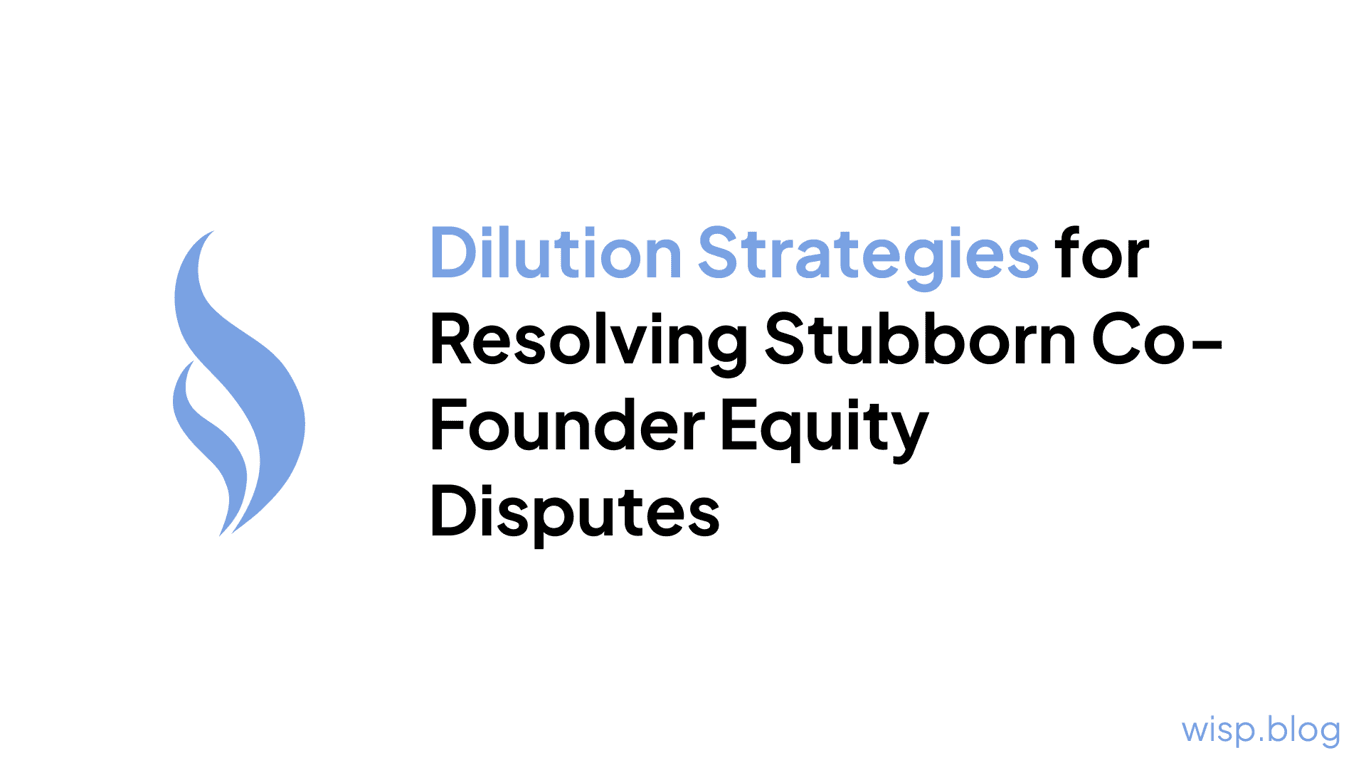
You and your co-founder were once perfectly aligned - two hungry entrepreneurs united by a bold vision to shake up your industry. You spent countless hours mapping out your big ideas over coffee, finishing each other's sentences with infectious enthusiasm.
But lately, things have felt off. You've caught yourselves disagreeing more frequently about priorities, product direction, and how to invest your limited resources. Little tensions and misalignments that used to be brushed aside now linger with mounting frustration. You're starting to worry that you're not on the same page anymore about what you're trying to build.
It's an all-too-common scenario for co-founders. In the thrilling early days, you're so hyper-focused on getting your startup off the ground that you may inadvertently gloss over deeper conversations about your long-term visions and expectations. After all, you were both equally jazzed about the idea - why wouldn't you want the same things?
But as your company evolves, small divergences in priorities and perspectives can quietly take root and widen into fundamental disconnects. One founder may want to bootstrap and grow organically, while the other is determined to raise funds and pursue aggressive growth. One may want to build a sellable startup for an exit, while the other dreams of creating an enduring company to lead for decades.
Left unaddressed, these misalignments inevitably breed resentment, distrust, and conflict that can derail or even unravel your startup entirely. You can't afford to keep having unproductive hallway battles and cutting remarks in team meetings. It's time to get back on the same page through frank, crucial conversations.
The good news is, you and your co-founder aren't the first to face this challenge. Countless startup teams have navigated co-founder disconnects successfully by committing to regular, structured conversations to reaffirm their shared vision and get expectations realigned. It's not about convincing the other person you're right - it's about finding a cohesive path you can both get behind wholeheartedly.
Schedule Dedicated "Founder Sync" Meetings
Block off a recurring 60-90 minute meeting every month or quarter dedicated solely to an open founder dialogue. No other team members, no distractions. Use a shared document to capture key discussion points and agreements. Treat this like a sacred meeting - don't cancel or let it get de-prioritized. You may even want to schedule it off-site to remove you from the usual office environment.
Discuss Your "Whys" Using "What" Questions
Go beyond surface-level "whats" of your goals - explore the underlying motivations behind each other's desired outcomes. Use "What" questions to dig deeper without making accusations:
"What is it about pursuing VC funding that's important to you? What are you hoping it will accomplish?"
"What makes you want to avoid investors? What concerns or past experiences are shaping that perspective?"
"What's driving your focus on an exit as the ideal outcome? What would that make possible for you?"
Don't make assumptions about their "whys." Let them elaborate so you can truly understand their reasoning and uncover any misaligned deeper motivations.
Reaffirm Your Shared Vision Using "What" Questions
Despite differences that emerge, you likely have an overarching shared vision that persists from your founding days. Reaffirm and realign on that purpose:
"What originally got us so excited and united around this vision? What was that driving sense of purpose?"
"What would our dream outcome look like in 5 or 10 years if we achieved everything we set out to do?"
"What are the core aspects of our original vision that still resonate with both of us no matter what?"
Use "What" questions to revisit and articulate that North Star vision you can both rally behind, even if your shorter-term priorities differ.
Discuss Personal Motivations Using "What" Questions
Misaligned personal motivations breed conflict. Have frank discussions using "What" questions to uncover them:
"What would 'success' with this company look like for you personally? What would it make possible?"
"What are your biggest professional or personal driving forces right now? What needs is this business helping you meet?"
"What role do you ideally want to have 5 years from now? What's motivating that ideal scenario?"
Understanding each other's deepest motivations keeps you from unknowingly working against one another.
Outline "Philosophical Differences" Using "What" Questions
There may be some fundamental differences in leadership philosophies or working styles that are here to stay. Get them on the table using "What" questions:
"What's more important to you - pursuing ambitious goals aggressively, or taking a more measured approach?"
"What's your decision-making style? What data or processes do you rely on before making a tough call?"
"What traits do you value most in the people and culture? What's your philosophy on that?"
Having this transparency prevents issues from being personal - you can make conscious tradeoffs and balance each other out.
Use Labeling and Mirroring Tactics
For particularly tense disagreements, use Chris Voss' "Labeling" and "Mirroring" tactics to facilitate productive dialogue:
Labeling:
"It seems like you're feeling frustrated that we're not more aligned on this..."
"You sound a bit concerned about the risks involved if we took that approach..."
Mirroring:
"...not more aligned on this?"
"...concerned about the risks?"
Labeling emotions and mirroring their last words shows you're listening and keeps them engaged versus becoming defensive.
Employ the "Accusation Audit" Technique
If discussions turn combative, perform an "Accusation Audit" to diffuse the tension:
Reframe accusations as neutral observations: "So it seems like you feel I'm being too risk-averse on this..." instead of "You're being so stubborn about this!"
Avoid making your own accusations in return - let the other person "empty their clip" before responding
The goal is to facilitate an open discussion, not debate who's right or wrong.
Capture Realigned Agreements
After each conversation, update a Founder's Agreement document capturing your refreshed:
Shared vision, purpose and long-term aspirations
Personal motivations, incentives and definitions of "success"
Philosophical agreements on leadership, culture and working styles
Priorities, strategies and concrete next steps for the near/long-term
Review this living document together frequently, updating it as needed to maintain complete alignment. Use it to re-ground yourselves in your "North Star" when tensions or disconnects re-emerge.
Even the tightest co-founder team will face disconnects as their company evolves. What matters is recognizing the issues early and committing to the open and honest communication required to realign. Use these strategies to facilitate productive crucial conversations before tensions escalate. Your startup's success depends on you operating as a unified force guided by a cohesive vision.


